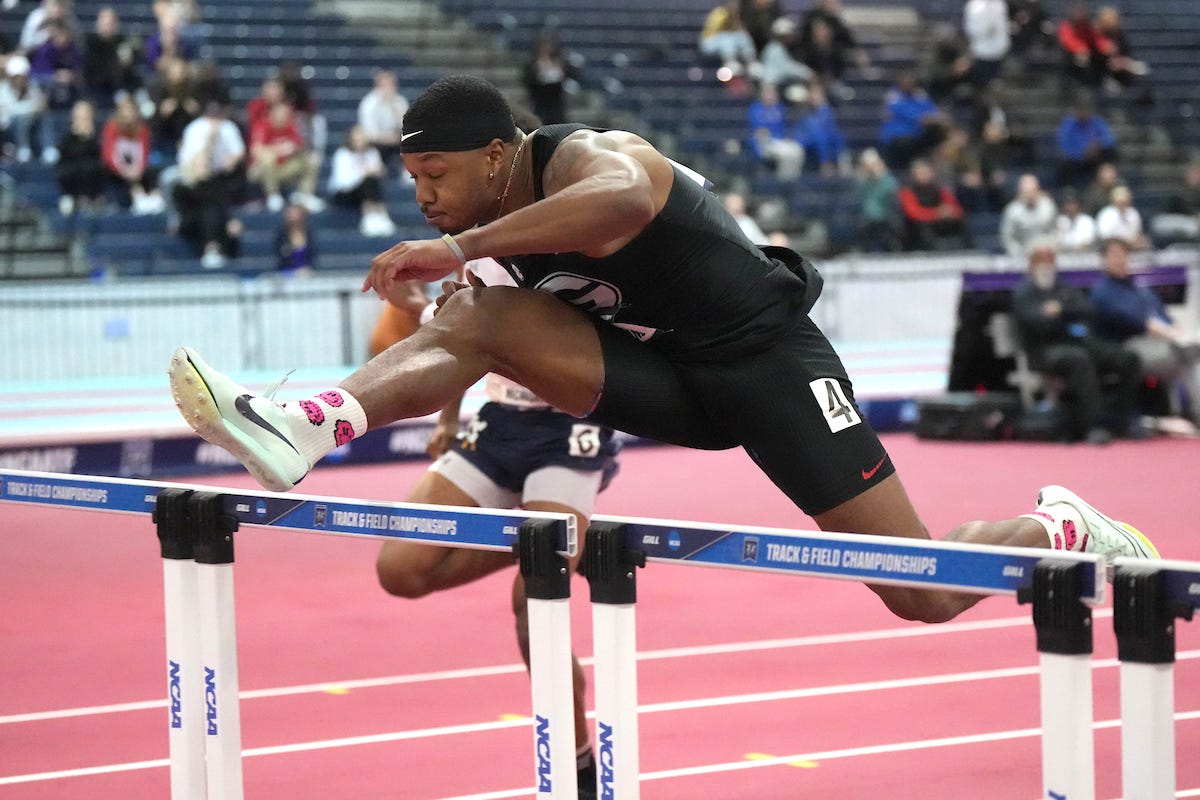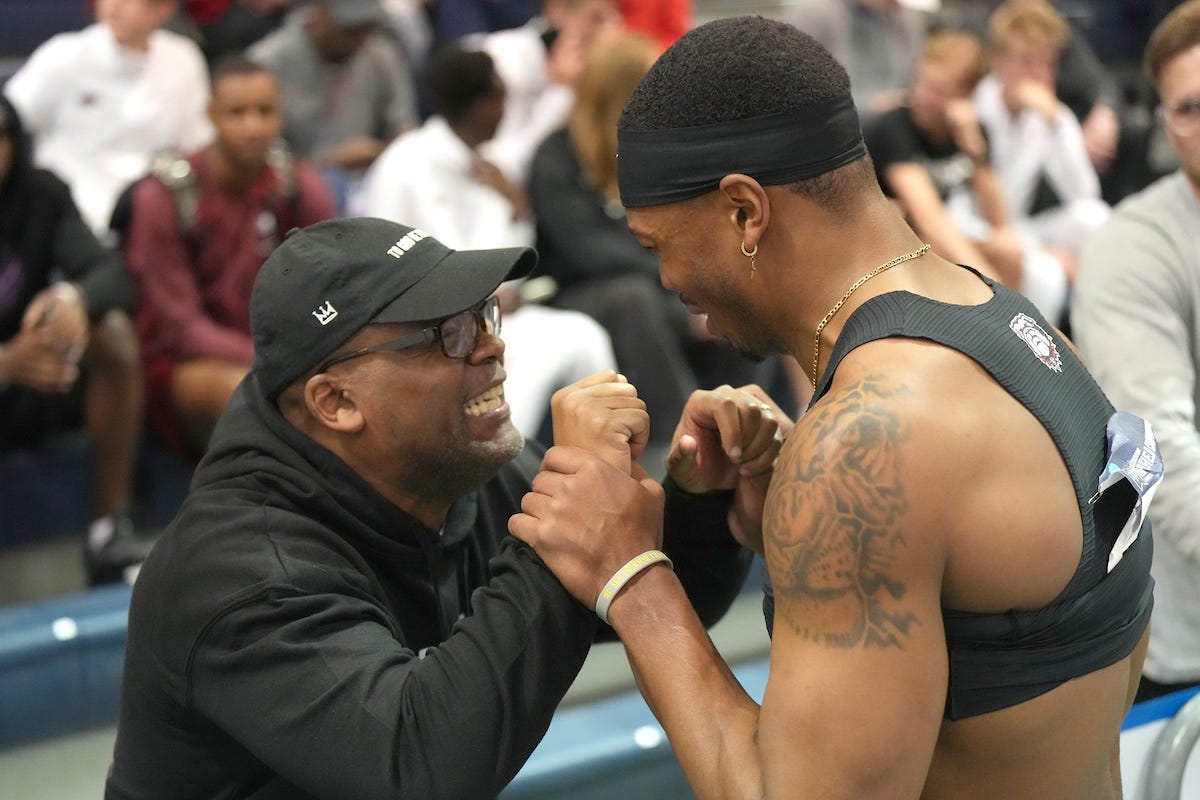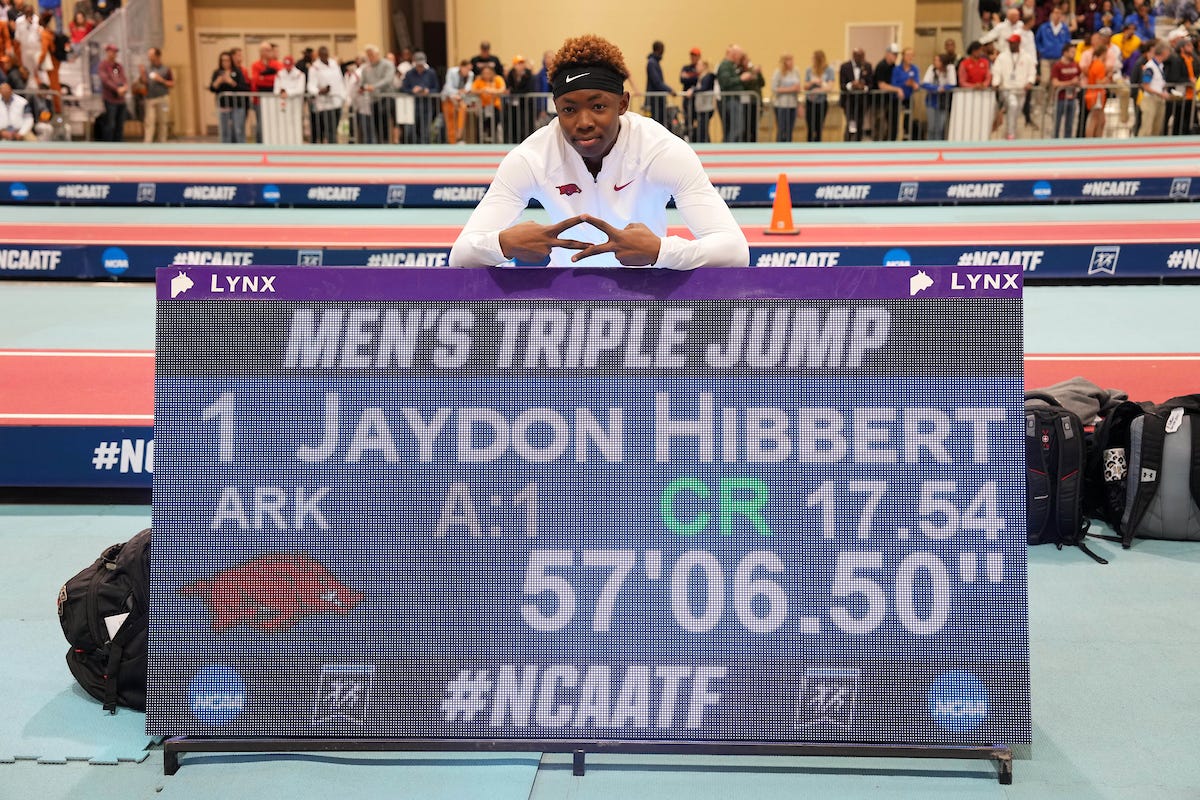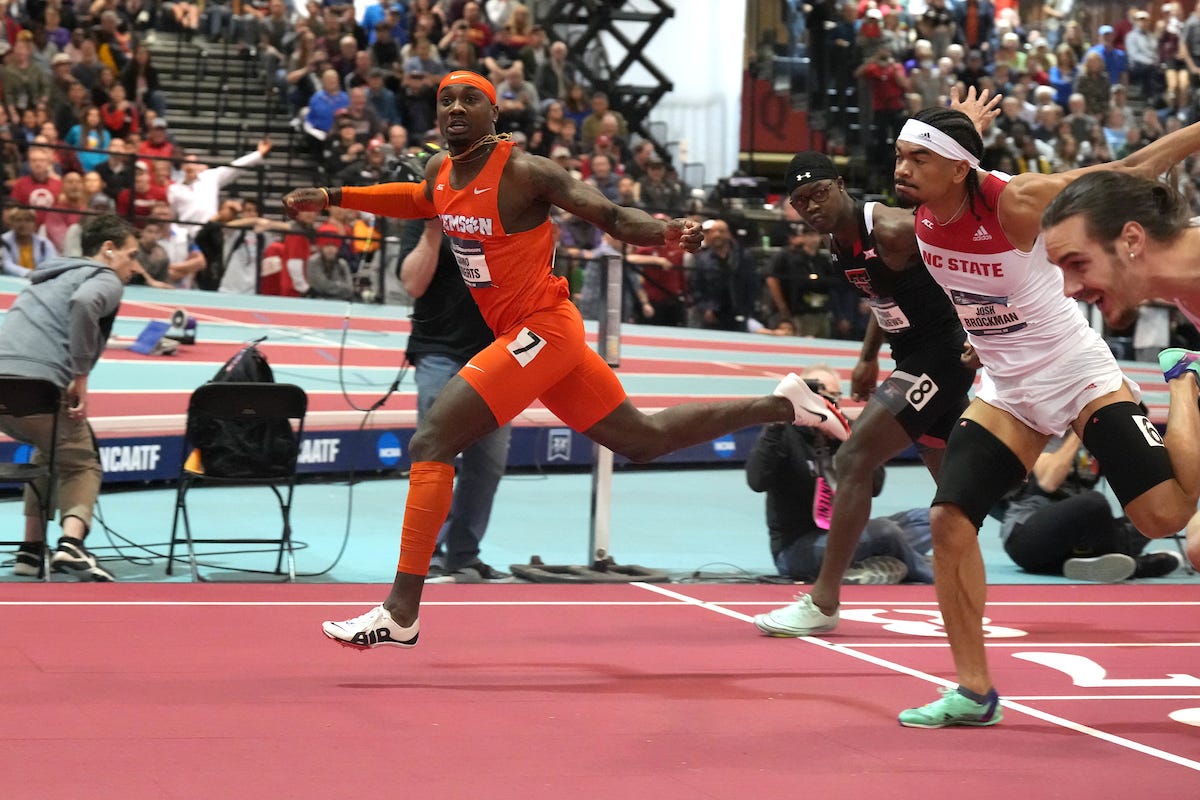Huge heptathlon performance stands out in NCAA champs
Garland gives world record a scare on day when Arkansas men win 21st team title

The University of Arkansas’ men’s team rolled to a record 21st title during the night portion of the NCAA Indoor Track and Field Championships at the Albuquerque Convention Center in Albuquerque, New Mexico on Saturday.
But when it came to individual brilliance in the men’s meet, no one could top the near-world record performance in the heptathlon that Georgia senior Kyle Garland capped earlier in the afternoon.
Arkansas freshman Jaydon Hibbert got the night portion of the meet off to a roaring start when he set a collegiate record of 17.54 meters (57 feet 6½ inches) in the triple jump on his first — and as it turned out his only — jump of the competition. But statistically speaking, that performance was not in the same class as Garland’s 6,639-point total in the heptathlon that crushed the collegiate record of 6,499 and just missed the world record of 6,645.
Ashton Eaton had set the previous collegiate record for Oregon in the 2010 NCAA meet and he produced the world record in the heptathlon in 2012, the year he won the first of two consecutive decathlon titles in the Olympic Games.
“To take that [collegiate record] down and be six points off the world record, it’s unfathomable,” Garland said in a post-competition interview on the FloTrack site.
Ayden Owens-Delerme of Arkansas also exceeded the previous collegiate record with his 6,518-point score that moved him to third on the all-time world performer list. But he was not close enough to Garland after six of the heptathlon’s seven events to have a chance to overtake him in the standings with a great performance in the 1,000.
Though he was very proud of his overall performance, Garland also took great pride in the personal best of 2 minutes 41.36 seconds that he ran in the 1,000 meters, the seventh — and final — event of the two-day competition.
The 858 points that he was awarded for his effort in the 1,000 were less than in any of the other heptathlon events, but the collegiate record-holder in the decathlon was “absolutely elated” with his performance.
Some of that was because the time was his first personal best in the event in a few years. But it might also have had something to do with the fact he held off Owens-Delerme in the overall standings after suffering an 11-point loss to his rival in last year’s NCAA meet despite entering the 1,000 with a 152-point lead.
“I had to stay true to my race,” Garland said when asked if what happened last year affected how he ran the 1,000. “I couldn’t try to chase him. I just needed to run [my race]. I knew I just needed to stay within 18 seconds or so of him. . . I knew I had it in the bag when that last lap came up.”
Although Owens-Delerme finished a little more than eight seconds in front of Garland in the 1,000, that was a much smaller gap than last year when he had finished about 14 and a half seconds in front of Garland when the Georgia senior ran 2:46.07.
Garland also had a larger point advantage over Owens-Delerme heading into the 1,000 this time around as he had performed extremely well in five of the first six events.
After totaling a personal best of 3,773 points on Friday while competing in the 60-meter dash (6.87), long jump (7.96 meters/26 feet 1½ inches), shot put (16.45/53-11¾), and high jump (2.12/6-11½), Garland ran 7.74 seconds in the 60 high hurdles to start the competition Saturday and followed that by clearing 5.16 (16-11) in the pole vault.
Owens-Delerme, who trailed Garland by 155 points after Friday, picked up three points on him when he ran 7.73 in the high hurdles, But he lost 62 points when he cleared 4.96 (16-0¾) in the pole vault.
“I had a great event up until the high jump,” Garland said of Friday. “That wasn’t the mark that I wanted. I knew I had to come back out here on day two and put together a crazy three events and execute the way I wanted to, and I knew something great would come. To see that [final score] pop up on the board was absolutely incredible.”

Although Owens-Delerme was unable to successfully defend his title from last year, Arkansas received eight points for his runner-up finish and another three for teammate Yariel Soto Torrado’s sixth-place total of 6,047 points.
That gave the Razorbacks a first-place total of 31 points when the remainder of the men’s meet re-started with the triple jump at 6:45 p.m. Arkansas hit paydirt early in that event as Hibbert’s booming triple jump of 17.54 (57-6½) topped the 37-year-old collegiate record of 17.50 (57-5) set by Charlie Simpkins of Baptist College —now Charleston Southern — in 1986.
The mark crushed Hibbert’s previous best of 17.10 (56-1¼), as well as the Jamaican record of 17.19 (56-4¾) set by Clive Pullen in 2017. It also demolished the world U20 (under 20) record of 17.20 (56-5¼) set by Melvin Raffin of France in 2017.
Although Hibbert passed his remaining five jumps of the competition, teammate Carey McLeod, winner of the long jump on Friday, added a sixth-place finish in the triple jump at 16.35 (53-7¾). That increased Arkansas’ point total to 44, and the race for first place in the team standings was close to over, as the Razorbacks were projected to score points in four more events and no other teams seemed likely to score more than 40 points in the meet.
Arkansas added four points to its total when senior Jordan West finished fifth in the shot put with a personal best of 20.47 (67-2) and picked up another four when senior Christopher Bailey placed fifth in the 400 in 45.32.
The Razorbacks scored another point when junior Lance Lang placed eighth in the 200 in 20.75 and they added 10 points to their total by winning the 1,600 relay in 3:02.09.
Sophomore Connor Washington ran a 46.48-second first leg for Arkansas in the 1,600 relay and senior teammate James Benson II followed with a 44.91 carry that gave the squad a lead it would never relinquish. Owens-Delerme, coming back from the heptathlon, gutted out a 46.56 leg, and Bailey followed with a 44.15 split — the fastest of the race — to give the Razorbacks a 63-point total and a comfortable margin of victory over runner-up Georgia, which had 40. Florida placed third with 34 points, followed by Washington with 31 points and Texas Tech with 29.
It was the first team title for Arkansas since 2013.
“I think everybody we brought here scored [points] from the distance medley to the 4x4 to the shot put,” Chris Bucknam, Arkansas men’s coach, told John Anderson of ESPN+. “We just put it together. We were dialed in. And we came here with a mission. We were pleased with that SEC championship. But to win this national title really is special.”
Georgia scored 30 of its 40 points via victories. In addition to Garland in the heptathlon, Elija Godwin won the 400 in 44.75 and fellow senior Matthew Boling took the 200 in 20.12.
Neither Godwin nor Boling had run particularly well in their semifinal races on Friday, but they came through on Saturday.
Godwin’s time, which came in the first of two sections, tied his personal best that he set in winning the SEC title two weeks earlier and gave him the two fastest times in the world this year.
Junior Ryan Willie of Florida placed second after running a personal best of 44.93 to win the second section, with third going to senior Matthew Moorer of Baylor, who ran 45.08 behind Godwin in the first section.
Boling, who ran 20.31 to finish third in his semifinal, cut seven hundredths of a second off his personal best in winning the first section with a time that moved him to fifth on the all-time collegiate performer list. And when sophomore Tarsis Orogot of Alabama won the second section in 20.20, Boling won his second 200 title in the last three years.
Boling also ran a 45.40-second opening leg on a Georgia team that finished second in the 1,600 relay in 3:03.10. Godwin was not part of the squad.

Washington scored 20 of its 31 points in the mile as junior Luke Houser led the Huskies to a 1-4-5-8 finish.
Houser clocked 4:03.33 after running his final 400 in 55.24 and his last lap in 26.39. He was followed by Isaac Basten of Drake in 4:03.36 and Anass Essayi of South Carolina in 4:03.61.
Joe Baskom of Washington placed fourth in 4:03.73 after winning the NCAA 1,500-meter title last June.
Oklahoma State, runner-up to Northern Arizona in the NCAA Cross Country Championships in November, scored all 25 of its points in two distance events.
The first 10 points came on Friday when the Cowboys won the distance medley relay in 9:28.77 and the remaining 15 came in the 3,000 on Saturday when sophomore Fouad Messaoudi placed first in 7:48.10 and junior teammate Alex Maier finished fifth in 7:50.74.
Messaoudi, who ran a 2:53.76 opening 1,200-meter leg for Oklahoma State in the distance medley, ran his final 400 of the 3,000 in 55.51 and his last lap in 26.77 in a race in which he sped past collegiate-record-holder Drew Bosley of Northern Arizona in the last 25 meters of the contest.
Bosley, third in the 5,000 on Friday, finished second in 7:48.34, followed by Jackson Sharp of Wisconsin in 7:48.66.
Dylan Jacobs of Tennessee, who won the 5,000 in 13:37.59, finished sixth in 7:52.25 after fading badly in the last lap.
Defending team champion Texas, which tied Oklahoma State for sixth in the standings this year, scored 18 of its 25 points in the 800 meters when sophomore Yusuf Bizimana and junior Crayton Carrozza were credited with first- and second-place finishes in 1:46.02 and 1:46.78, respectively, after Mississippi State senior Navasky Anderson was disqualified after crossing the finish line first in 1:45.90.
Anderson had led the field through 400 meters in 50.55 and he had a lead of 7-8 meters over his closest pursuer when he came through three laps (no splits were available). But his lead began to disappear down the backstretch, and when Bizimana began to close in on him in the home straightaway, Anderson started to drift to his right from lane one. He was in lane three by the time he crossed the finish line after making contact with Bizimana.
ESPN+ commentator Dwight Stones said right after the race that Anderson might have committed a foul by impeding the progress of Bizimana. Officials eventually ruled that had occurred and Anderson was disqualified.
The two straightaway races went to Terrence Jones of Texas Tech in the 60-meter dash and to Giano Roberts of Clemson in the 60 high hurdles.
Jones, a sophomore who tied the collegiate record of 6.45 in the 60 last year, had run 6.46 to win the Big 12 Conference title two weeks earlier, and he repeated that performance on Saturday to finish well in front of Kentucky freshman Jordan Anthony (6.55) and Florida senior PJ Austin (6.56).
Sophomore Favour Ashe of Auburn did not start the race after aggravating an injury to his right hamstring while winning his semifinal in 6.51.
Roberts had entered the meet with a best of 7.62 in the 60 high hurdles and his 7.66 clocking in the semifinals made him the sixth of eight hurdlers to advance to the final. But he had a solid margin of victory in the final as his personal best of 7.55 put him four hundredths of a second ahead of runner-up Caleb Dean of Texas Tech (7.59) and five hundredths in front of Darius Luff (7.60) of Nebraska, who had been the leading qualifier at 7.54.

Arizona senior Jordan Geist won the shot put with a best of 21.15 (69-4¾) after finishing third in last year’s meet, 13th in 2021, and fifth in 2019.
Jonah Wilson of Nebraska finished second with a personal best of 20.91 (68-7¼) and two-time defending champion Turner Washington of Arizona State placed third with a season best of 20.72 (67-11¾).
Junior Romaine Beckford of South Florida won the men’s high jump 2.24 (7-4¼). Vernon Turner of Oklahoma, Devin Loudermilk of Kansas, and Trey Allen of Louisville each cleared 2.21 (7-3), with tiebreaking rules putting Turner in second place, and Loudermilk and Allen tied for third.
Beckford cleared 2.10 (6-10¾), 2.15 (7-0½), 2.18 (7-1¾), 2.21 and 2.24 on his first attempts before missing three times at 2.27 (7-5¼).
Turner finished second because he cleared 2.21 on his first attempt. Loudermilk and Allen each needed three tries to clear 2.21 after making 2.10, 2.15, and 2.18 on their first attempts.
The 2024 NCAA Indoor Track and Field Championships will be held at the TRACK at new balance at Boston Landing in Brighton, Massachusetts on March 8-9.



